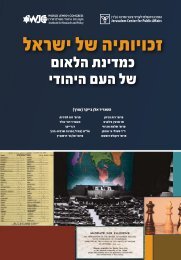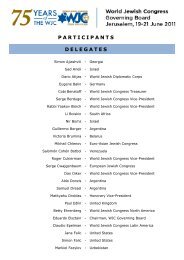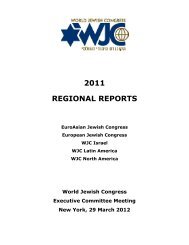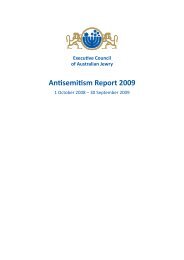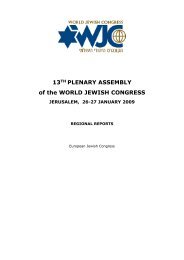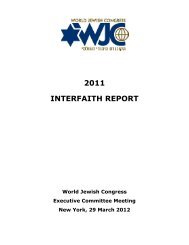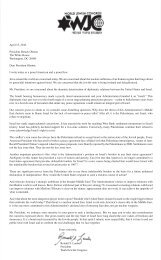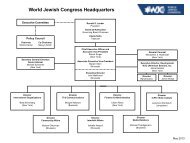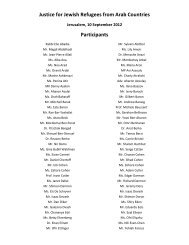Palestinian Unilateralism and Israel's Rights in Arab-Israeli Diplomacy
Palestinian Unilateralism and Israel's Rights in Arab-Israeli Diplomacy
Palestinian Unilateralism and Israel's Rights in Arab-Israeli Diplomacy
Create successful ePaper yourself
Turn your PDF publications into a flip-book with our unique Google optimized e-Paper software.
Uproot<strong>in</strong>g the Pr<strong>in</strong>ciples of <strong>Arab</strong>-<strong>Israeli</strong><br />
<strong>Diplomacy</strong> at Madrid<br />
The damage that the <strong>Palest<strong>in</strong>ian</strong> unilateral race for statehood has done to the Middle East peace<br />
process goes well beyond the violations of signed agreements between the sides at Oslo <strong>and</strong> extends<br />
beyond the <strong>Palest<strong>in</strong>ian</strong> destruction of the Oslo bilateral negotiat<strong>in</strong>g framework. It also underm<strong>in</strong>ed<br />
the broader framework of <strong>Arab</strong>-<strong>Israeli</strong> diplomacy that was first established at the 1991 Madrid<br />
Peace Conference. Madrid represented a def<strong>in</strong><strong>in</strong>g moment <strong>in</strong> <strong>Arab</strong>-<strong>Israeli</strong> diplomacy. Its underly<strong>in</strong>g<br />
pr<strong>in</strong>ciples of direct, unconditional negotiations between Israel <strong>and</strong> all of its <strong>Arab</strong> neighbors, <strong>and</strong><br />
not just the <strong>Palest<strong>in</strong>ian</strong>s, under the protective umbrella of the pr<strong>in</strong>ciples of mutual compromise,<br />
recognition, <strong>and</strong> a strict code of conduct prohibit<strong>in</strong>g <strong>in</strong>citement, served as the first substantial<br />
build<strong>in</strong>g blocks for a comprehensive peace agreement between Israel <strong>and</strong> the <strong>Arab</strong> world. The<br />
<strong>Palest<strong>in</strong>ian</strong> unilateral bid for statehood underm<strong>in</strong>ed several pr<strong>in</strong>ciples of diplomacy established at<br />
Madrid that may prove virtually impossible to recover:<br />
f f Respect for the mutuality of rights <strong>and</strong> claims of Israel <strong>and</strong> its neighbors. Madrid’s<br />
chief architect, U.S. Secretary of State James Baker, was careful to avoid establish<strong>in</strong>g any<br />
preconditions or prejudic<strong>in</strong>g Israel’s rights. In a side letter to the United States prior to<br />
the conference, Prime M<strong>in</strong>ister Yitzhak Shamir <strong>in</strong>sisted that Jerusalem is not a subject for<br />
negotiation. 44 Israel’s right to build communities on both sides of the June 4, 1967 “Green<br />
L<strong>in</strong>e” <strong>and</strong> <strong>Israeli</strong> settlements were not considered an obstacle to advanc<strong>in</strong>g either bilateral<br />
talks with the Jordanian-<strong>Palest<strong>in</strong>ian</strong> delegation or multilateral peace talks between Israel <strong>and</strong><br />
its <strong>Arab</strong> neighbors. 45<br />
In contrast, s<strong>in</strong>ce 2009, the <strong>Palest<strong>in</strong>ian</strong> Authority, with the back<strong>in</strong>g of the U.S. adm<strong>in</strong>istration <strong>and</strong><br />
Europe, made the cessation of <strong>Israeli</strong> settlement build<strong>in</strong>g a precondition for restart<strong>in</strong>g <strong>Palest<strong>in</strong>ian</strong>-<br />
<strong>Israeli</strong> negotiations, allow<strong>in</strong>g the <strong>Palest<strong>in</strong>ian</strong>s to pursue a unilateral path with greater <strong>in</strong>ternational<br />
support despite Israel’s <strong>in</strong>sistence that this precondition was not rooted <strong>in</strong> any past agreements or<br />
pr<strong>in</strong>ciples of past peace processes, which were established at Madrid.<br />
ff<br />
The pr<strong>in</strong>ciple of a negotiated solution without imposed boundaries. Former President<br />
George H. W. Bush refused to impose or suggest specific borders, tell<strong>in</strong>g the packed plenum<br />
at Madrid, “Throughout the Middle East, we seek a stable <strong>and</strong> endur<strong>in</strong>g settlement. We’ve not<br />
def<strong>in</strong>ed what this means. Indeed, I make these po<strong>in</strong>ts with no map show<strong>in</strong>g where the f<strong>in</strong>al<br />
borders are to be drawn.” 46 In stark contrast, <strong>Palest<strong>in</strong>ian</strong> leaders Mahmoud Abbas <strong>and</strong> Salam<br />
Fayyad <strong>in</strong>sist that “Palest<strong>in</strong>e” will be born on the 1967 l<strong>in</strong>es unilaterally. Their claims were<br />
strengthened by the public declaration of President Barack Obama, who, while oppos<strong>in</strong>g<br />
<strong>Palest<strong>in</strong>ian</strong> unilateralism, provided it with a tailw<strong>in</strong>d by revers<strong>in</strong>g forty years of U.S. policy<br />
<strong>and</strong> publicly stat<strong>in</strong>g his adm<strong>in</strong>istration’s support for the 1967 l<strong>in</strong>es as a basis for Israel’s future<br />
borders. 47<br />
124





